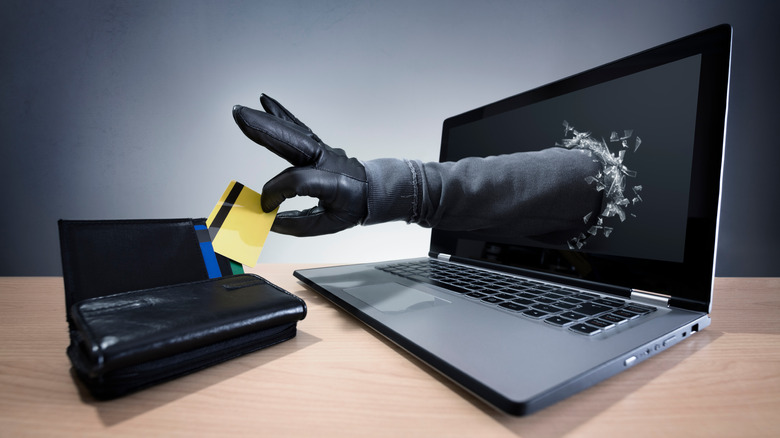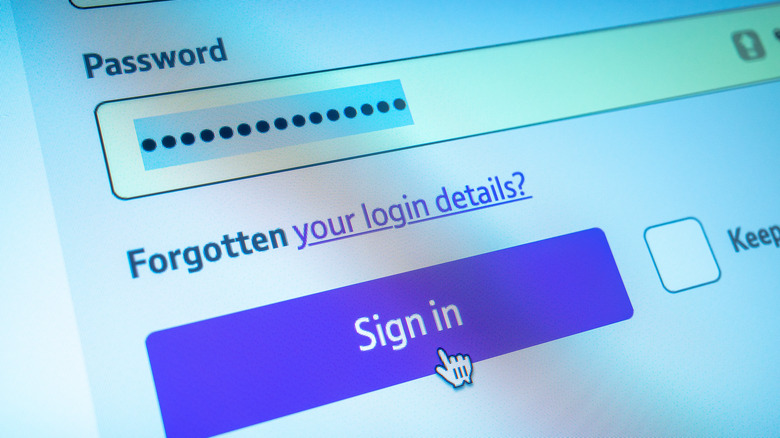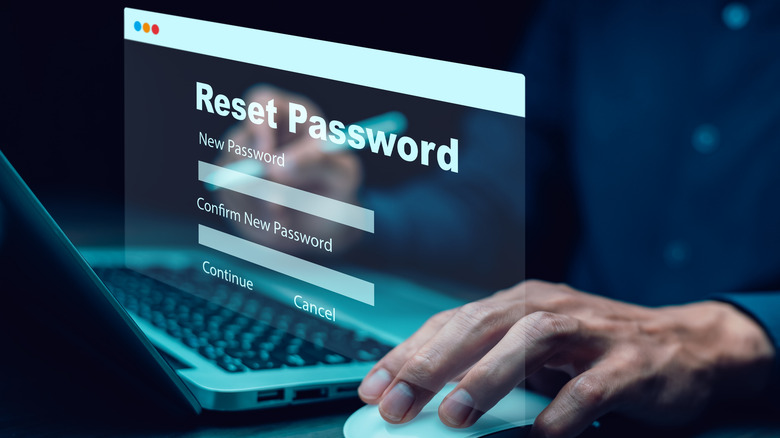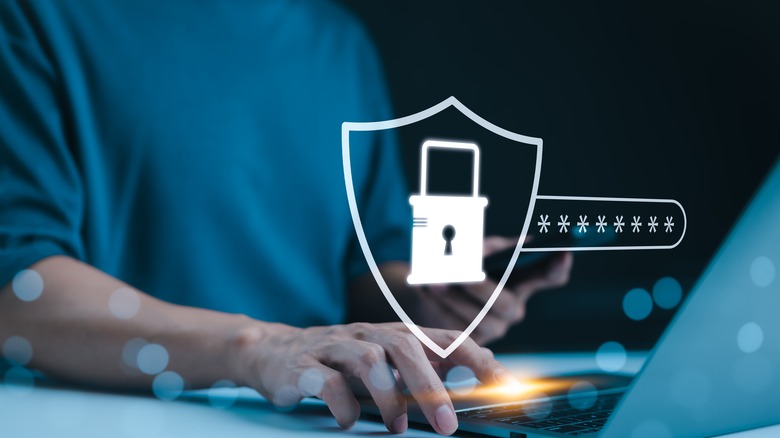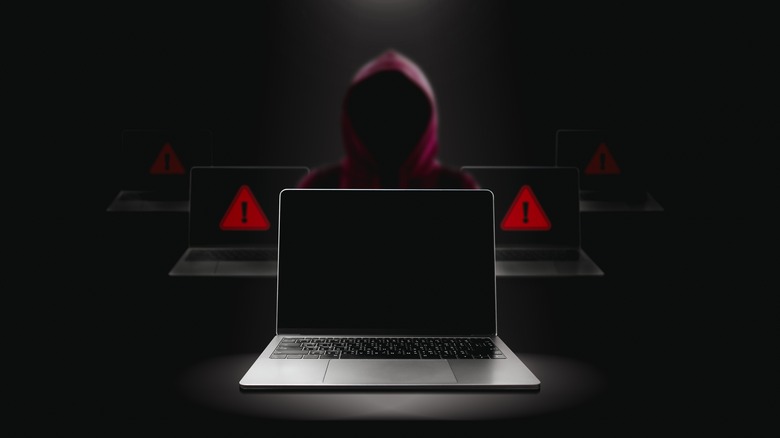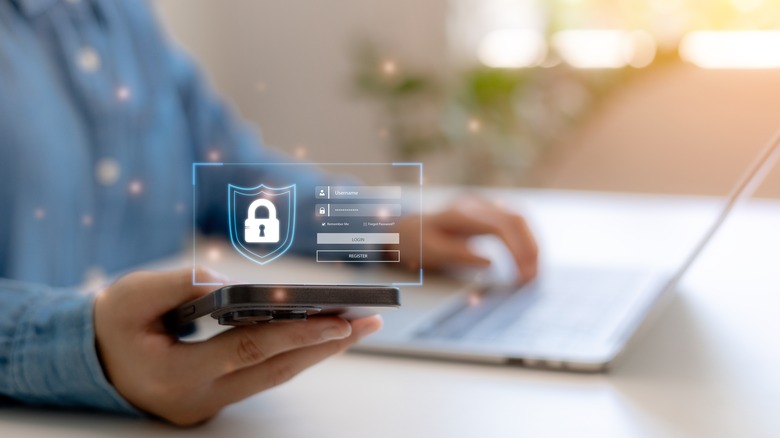Unsettling Reasons Why You Might Want To Avoid Using The Same Password Over & Over
You need an account for just about everything these days. You need to create accounts for services such as Gmail, Netflix, and Amazon, as well as for online forums or sites like Reddit and YouTube. And even if an account isn't strictly required, you might be locked out of certain features or content until you make one. With so many accounts to keep track of, you will have to memorize just as many passwords. Or do you? The answer is (mostly) yes.
Password security is something you shouldn't take lightly or cut corners on. For instance, you have to avoid passwords that are constantly hacked – the stronger and less obvious a password, the better. Let's say you come up with the perfect password for one account. But what about the 87 other accounts? You might be tempted to reuse the password for most or even all of them. After all, this magnum opus of a code is impregnable, right? In truth, it's not impregnable yet. Reusing the same password across multiple accounts, no matter how strong, is actually a horrible internet safety strategy. We'll go through all the ways this can backfire and potentially compromise others in your network or beyond.
Shared passwords let hackers use credential stuffing
When hackers get your password for one account, they only know it belongs to that account. If you reuse passwords across sites and services, hackers don't necessarily know the passwords for those accounts or that you're associated with them. But that won't stop them from using those credentials on all these sites.
One common trick hackers use is called "credential stuffing." As its name suggests, this tactic involves collecting stolen usernames and passwords and using them to gain access to different sites. Access is not guaranteed, but when a user reuses their passwords across multiple sites, they often pair them with the same username for convenience, increasing the likelihood of success for hackers.
Again, using credential stuffing to gain illicit access is not always successful, as not all accounts use identical credentials or usernames. However, once hackers obtain one valid username/password pair, they can use it to access multiple accounts, potentially obtaining sensitive information that they can employ for further attacks. It might take a few tries, but sooner or later what began with one stolen username and password can eventually lead hackers to accounts with valuable information, such as credit card details and social security numbers.
You can and will lose more than accounts
Not all accounts are created equal, and you risk different things by losing different accounts. A compromised TikTok account will only reveal the kinds of embarrassing videos you like to watch, but a hacked Amazon account could expose your purchase history, payment details, and shipping addresses.
The more accounts that share the same password and username, the greater the potential damage becomes if even one is compromised. With enough information (and the aforementioned credential stuffing), hackers can gain access to dangerously personal information. And once they have the info they need, they can exploit it in various harmful ways.
You've likely heard stories about hackers siphoning bank accounts, selling stolen personal data on the dark web, or pretending to be someone else. All of these were the results of various hacking methods, and if you reuse passwords and usernames across multiple accounts, you're only making things easy for hackers. But your personal data isn't the only thing at risk. Let's assume you work with company databases, and your work account shares the same password with, say, your YouTube channel. Once someone steals your YouTube password, if they learn what company you work for, they could use these credentials to sneak into your company's database. Not only would this compromise security of hundreds, if not thousands, of customers, it would also decimate your company's reputation. Who in their right mind would ever trust their data with an organization so easily hacked?
Not all sites have the same level of protection
No two people go about internet security the same way. Many users on highly-rated antivirus programs, but these primarily secure their personal data on their local devices. If you use the internet, your data is likely stored in multiple databases, each protected by its own security measures.
In reality, while most websites implement some form of protection, their security measures can vary significantly. Some secure usernames and passwords with encryption that is difficult to crack on top of the normal firewalls. Other sites may store this data as plain text, relying solely on a firewall for protection. Once (not if) hackers breach that digital barrier, usernames and passwords are theirs for the taking.
Let's say you visit the webstore of a somewhat obscure — but still very legitimate — business. You make an account to buy an item from the site, but since you plan to only make one purchase, you don't put much effort into the account. In effect, you might inadvertently reuse a username and password from another account, essentially creating a burner account. This sounds like a good idea on paper, but since the store's owner doesn't have much spare cash, their security is minimal. If hackers break into their database, they could easily obtain your info, including a username and password they wouldn't be able to obtain from other sites with more robust security. People pick the path of least resistance for a reason.
Phishing a password is bad, phishing a shared password is worse
If you've seen one phishing attack, you've seen them all. At least, that's the theory. Most people know that emails claiming their Netflix account is about to be deleted are as illegitimate as classic scams like those from a Nigerian prince offering money. However, some phishing attempts can actually work, and the amount of damage they cause varies depending on who falls for it.
Most phishing attacks resemble a fishing technique called trawling, where a large net is cast to catch whatever it might drag up. Statistically speaking, at least one person falls for every phishing attempt, especially if hackers are sneaky about it. Many people might ignore a phishing email that claims their Netflix account is about to be canceled, but they could be more susceptible to an email questioning a $600 PlayStation game purchase. Regardless of the email's subject, sharing a password reused across multiple accounts gives phishers access to information they might not gain through a more obvious scam.
One dangerous form of phishing, known as "whaling," targets specific individuals with tailored attacks. The perpetrator carefully designs the message to look more legitimate, believing they can steal significant information or money from the target. If you fall for a phishing or whaling attack while reusing the same password for multiple services, you could end up proving the cybercriminal right.
Even a similar password is dangerous
Humans are savants when it comes to distinguishing patterns. Many hackers know that if someone uses a password for one account, odds are they use it for another account. However, even when that isn't the case, hackers can use other methods to steal even more data.
Hackers have several password-related tools that help them during data heists. We already talked about credential stuffing, but another trick that lets them use passwords they already know is the "dictionary attack." Instead of using the password directly to access an account, the hacker uses it as a baseline to generate potential variations. For instance, say your YouTube password is "gabonandslogra," but your Amazon password isn't. A hacker who knows your YouTube password could use a dictionary attack to guess your Amazon password, "gab0n&sl0gra."
The unfortunate reality of the human mind is that while we are smart because our brains can see patterns other animals cannot, we are so addicted to patterns that when we don't see any, we make some up. This tendency makes us predictable. Even if we don't use the same password for every online account and service, hackers know that many people create passwords with a pattern, such as the aforementioned variations. While it's harder to remember 80 unique passwords, it's significantly harder for hackers to crack them without relying on credential stuffing or dictionary attacks.
Once hackers have one password, they can reset others
Every website and online service that requires users to sign in with a password provides a means to reset it. Sometimes the process is straightforward, while other times it can be frustratingly complicated, but it's always an option. So how do you tell the difference between a legitimate user who forgot their password and a hacker trying to change it? You can't.
Once a hacker gains access to any one of your passwords, they can potentially reset it to lock you out. Of course, once you realize this, you can reset the password yourself, lock them out, and pick a new password that the hacker won't easily guess — until they do and reset it again. At first glance, this game of cat and mouse could prove annoying and hamstring your use of one account, but it becomes a bigger issue if you reuse passwords.
If hackers figure out you reuse passwords and account names across multiple websites and services, they can reset multiple passwords at once. And even if you have some accounts that don't use the same passkey, hackers can potentially glean enough information to guess your username and request a password reset on those websites. While you will never be permanently locked out of these services, the more accounts hackers can attack and reset, the harder it will get to regain access quickly and avoid serious damage.
Recycling passwords is just as dangerous as reusing
While a strong password can help protect an account, statistically speaking, hackers learning your passkey is a matter of when, not if. Unfortunately for victims of these security breaches, hackers don't have the attention span of goldfish — they use automated tools and powerful computers to cause some form of permanent damage.
When hackers steal information, including passwords, they tend to keep a record of their illicit gains. While it's not a hard and fast rule, hackers generally don't delete the information they steal, even if it's outdated, because it might still be useful later.
Let's say that your Amazon account password is stolen, but you are able to reset it without much incident. And let's also say this incident scares you enough to never use that password for Amazon again. If you decide to create a new account for a different service, hackers will start trying to break in by utilizing all the passwords they have already collected, including yours. If you reuse the stolen password from Amazon for another account, hackers can break into the new account much faster. While hackers might eventually sneak into this other account, you can slow them down by blacklisting every password that has ever been compromised by data leaks and phishing attempts. It's a nuclear option, but it's the only way to be sure.
Compromised accounts can result in a snowball effect
Passwords are kind of like vaccines: They protect your personal accounts and information. And just like vaccines, if you work in IT and maintain databases, passwords help protect the information of the people whose data you manage. But it only takes the right hack in the wrong place to spark a digital epidemic.
Cyberattacks can hit anyone for any number of reasons, and while databases are common targets, smart (or lucky) hackers try to steal the credentials of IT workers, especially those who use the same passwords for personal and professional accounts. If successful, these hackers can gain access to all the information on a database. Depending on the site, this could include highly critical and sensitive information like bank account details, credit card numbers, social security numbers, and even industry secrets. But the data breach could also include usernames and passwords.
As with phishing, the odds sadly favor the hackers. If a hacker makes off with an entire database of usernames and passwords using credential stuffing (or an old-fashioned brute force attack), they could use those purloined passwords to steal even more accounts via even more credential stuffing or dictionary attacks. And should these pilfered passwords lead to more databases full of even more passwords and usernames, the process will repeat again because hackers love spreading misery. The more accounts they can crack from one chain of credential stuffing, the better for them and worse for everyone else.
Stolen passwords can lead to malware
As previously stated, once a password is stolen, hackers can potentially access and exploit all associated accounts. Depending on the administrative privileges, this could give some cybercriminals the chance to do more than just steal data.
The type of account determines the kind of information hackers can steal, whether the account shares passwords or not. Company databases are by far the most valuable targets since they could contain bank information and trade secrets, in addition to usernames and passwords that lead to even more unrelated accounts. More importantly, accounts with admin privileges allow hackers to launch old-fashioned malware attacks.
Once a cybercriminal has high-level access to a database, server, or drive, they can install malware similar to what you might encounter from normal (and unprotected) web surfing. This includes ransomware that encrypts data, spyware that logs user activity, and cryptominers that hijack processing power to mine cryptocurrencies. Of course, hackers can always try to brute-force their way into databases and servers to do all this, but if word gets out that they succeeded due to credential-stuffed passwords, the company's reputation will become irreparably tarnished.
Not even password managers are safe
Instead of reusing passwords or making up passwords for every new account, you should start using password managers. However, you shouldn't rely on these programs blindly because, while they help secure your info, they aren't completely foolproof.
Under normal circumstances, we highly recommend using password managers. These programs create passwords for countless accounts and remember all of them for you. Each password could be a random string of numbers and letters that's nearly impossible for a human to memorize, but with a password manager, they're all safe. That is, until a hacker manages to crack the password manager.
When you use a password manager, you still have to memorize a "master password" that unlocks the program for you. If you neglect basic computer safety and accidentally install a keylogger, a cybercriminal could steal your password manager's master password, which would give them the keys to your digital kingdom of automated passcodes. Or, even worse, if you use an online-only password manager and reuse a pre-existing password for the master password, a hacker could use credential stuffing to access your account. Then, all your hidden credentials would be laid bare. Password managers are no replacement for common sense internet safety practices; they just make the process less frustrating.


